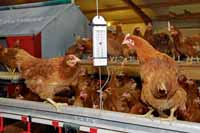In pursuit of the perfect pullet

While the conventional cage-ban dominates discussions in the intensive indoor egg sector, the UK’s organic producers have been quietly preparing for their own major change in legislation – the move to 100% organic pullets.
But what was first seen as another burden on the organic eggs sector, which has suffered a dramatic drop in sales volumes and prices over the past two years, could be a boon, with producers and industry leaders reporting excellent results so far.
“Full organic rearing is proving to be a tremendous success,” says Mike Burrows from High Peak Organic Feeds. “The benefits are the birds are much stronger, they are keeping up peak lay for longer and they don’t need to be de-populated at week 72 because they are still way above 86% lay,” he said.
One unexpected benefit of 100% organic rearing is there has also been a reduction in the problems faced by organic producers because the birds are not allowed to have their beaks trimmed.
“They haven’t been beak tipped, but because they have access to the outside from approximately eight weeks old, their beaks, which are still soft, start to wear down as they forage.
“Light intensity is also slightly higher, because you have daylight in the sheds, and you haven’t got the problem of birds running for dark corners once they go through into the laying shed,” says Mr Burrows.
Shane Brettell, a Columbian Blacktail producer from Shrewsbury in Shropshire, has been rearing his own 100% organic birds for the past eight years.
He was motivated to start rearing his own after the process of converting 16-week-old pullets from conventional rearing to organic proved to be too costly and stressful for the birds.
“We were finding we were getting an awful lot of feather pecking and vent pecking. I was taking 10 dead birds out a day,” Mr Brettell recalls. “When bringing the birds out of a big shed into a small shed, they had to sort out their hierarchy and you get a lot of fighting. But if you rear them in the same flock size there is no stress for them.
“Now we’ve got no feather or vent pecking. They look as good as when they go in, when they come out at the end of lay. The difference is unbelievable.”
Egg production is also excellent, with Mr Brettell saying he gets 1820 eggs from 2000 birds a day.
One problem the sector still faces ahead of the new EU regulation coming into play at the end of the year, will be finding the birds in sufficient quantity, warns Mr Burrows.
“A lot of the large commercial organic flocks can’t do it with just 2000 birds. It’s a big problem,” he said. “Bigger producers have been using part-organic pullets. Once they switch to fully organic, where will they get them from? Most of the rearing farms don’t have organic pasture outside. I don’t know where they are going to come from.”
